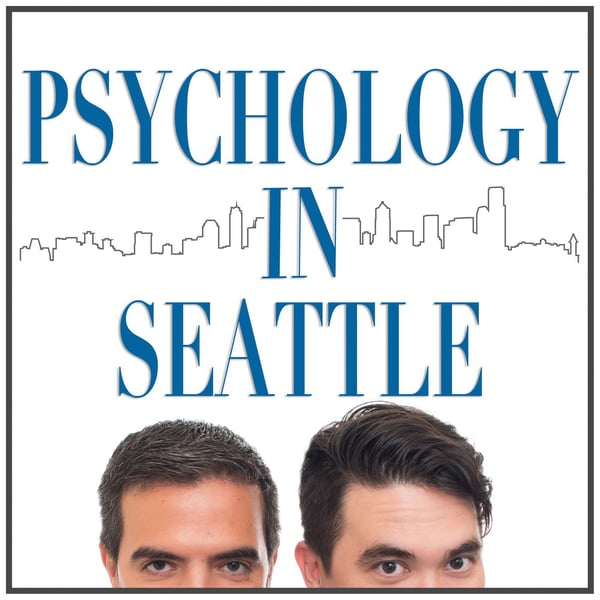Helping Children Sleep
Psychology In Seattle Podcast
Kirk Honda
4.6 • 1.2K Ratings
🗓️ 28 July 2021
⏱️ 43 minutes
🧾️ Download transcript
Summary
Become a patron: https://www.patreon.com/PsychologyInSeattle
Email: https://www.psychologyinseattle.com/contact
Get merch: https://teespring.com/stores/psychology-in-seattle
Dr. Kirk’s Cameo: https://www.cameo.com/kirkhonda
Instagram: https://www.instagram.com/psychologyinseattle/
Discord: https://discord.gg/6QR4sE8x9K
Reddit: https://www.reddit.com/r/PsychologyInSeattle/
Twitter: https://twitter.com/PsychInSeattle
Facebook Official Page: https://www.facebook.com/PsychologyInSeattle/
Facebook Fan Page (run by fans): https://www.facebook.com/groups/112633189213033
The Psychology In Seattle Podcast ®
Trigger Warning: This episode may include topics such as assault, trauma, and discrimination. If necessary, listeners are encouraged to refrain from listening and care for their safety and well-being.
Disclaimer: The content provided is for educational, informational, and entertainment purposes only. Nothing here constitutes personal or professional consultation, therapy, diagnosis, or creates a counselor-client relationship. Topics discussed may generate differing points of view. If you participate (by being a guest, submitting a question, or commenting) you must do so with the knowledge that we cannot control reactions or responses from others, which may not agree with you or feel unfair. Your participation on this site is at your own risk, accepting full responsibility for any liability or harm that may result. Anything you write here may be used for discussion or endorsement of the podcast. Opinions and views expressed by the host and guest hosts are personal views. Although, we take precautions and fact check, they should not be considered facts and the opinions may change. Opinions posted by participants (such as comments) are not those of the hosts. Readers should not rely on any information found here and should perform due diligence before taking any action. For a more extensive description of factors for you to consider, please see www.psychologyinseattle.com
This show is part of the Spreaker Prime Network, if you are interested in advertising on this podcast, contact us at https://www.spreaker.com/show/3269717/advertisement
Transcript
Click on a timestamp to play from that location
| 0:00.0 | Hey, just your listeners. As many of you know, because I talk about it often is the importance of sleep. |
| 0:06.1 | And for all of us to get a good night's sleep and how we have a culture that often goes against |
| 0:13.7 | notions of having good sleep and how work is creeping in on our good sleep and how |
| 0:19.6 | stress can cause problems. And one of the issues that a lot of the parents will face is trying to |
| 0:25.3 | help their children to sleep throughout the night. And there's a lot of research |
| 0:28.8 | pointing to the importance of children getting a good night's sleep of varying ages. And while I'm |
| 0:34.0 | on this topic, like the whole having high school kids, like go to school at seven in the morning |
| 0:39.2 | and the research against all that nonsense. And how the pandemic actually pushed things forward |
| 0:45.1 | a little bit because they had that flexibility. And now that the pandemic is kind of ending, |
| 0:48.5 | they're pushing it back. But anyway, someone reached out to me to talk about sleep and children. |
| 0:54.8 | I thought I'd have her on the show to talk about that topic. Please introduce yourself to podcast |
| 1:00.3 | land. Hi, I'm Dana Opelman. I'm the creator of the Sleep Sense program, which is a do-it-yourself |
| 1:07.2 | guide for tired parents to help them get their children's sleep on track. And I've been in the |
| 1:13.9 | wonderful world of sleep for the past 18 years. So it's definitely a passion of mine. And I |
| 1:21.7 | work hard to make sure that people know as much as they can about sleep and that they're getting |
| 1:26.0 | as much as they can. The pandemic has in some ways made sleep harder for people in general, I think, |
| 1:33.9 | because our body clocks work better when we're on a schedule. And when we're going to bed at the |
| 1:41.2 | same time every night and waking up at the same time every morning, that's optimal. That's how we're |
| 1:45.6 | designed to work. And with people's schedule kind of flying out the window, people are saying |
| 1:52.4 | up way later, kids are staying up way later. And that inconsistency of the schedule just kind of |
| 1:59.8 | wreaks havoc on our circadian rhythm. Yeah, that's one of the things that I've learned as I've |
| 2:04.4 | gotten older, how fragile my sleep has become. When I was younger, I would just fall asleep any |
... |
Please login to see the full transcript.
Disclaimer: The podcast and artwork embedded on this page are from Kirk Honda, and are the property of its owner and not affiliated with or endorsed by Tapesearch.
Generated transcripts are the property of Kirk Honda and are distributed freely under the Fair Use doctrine. Transcripts generated by Tapesearch are not guaranteed to be accurate.
Copyright © Tapesearch 2025.

